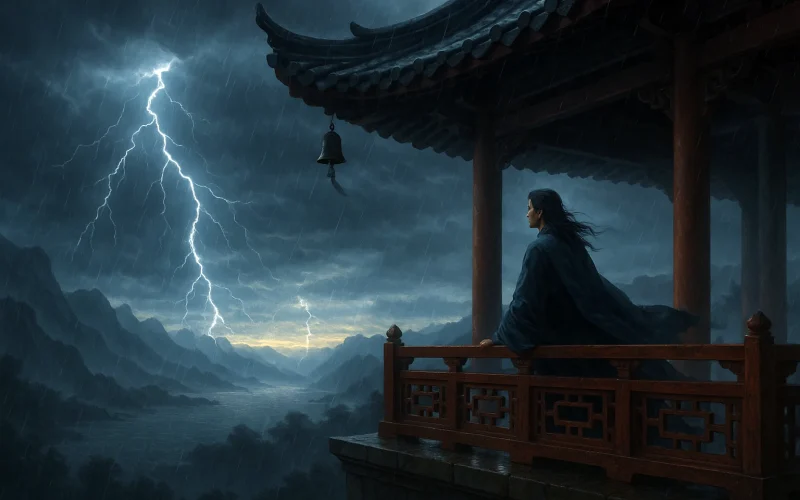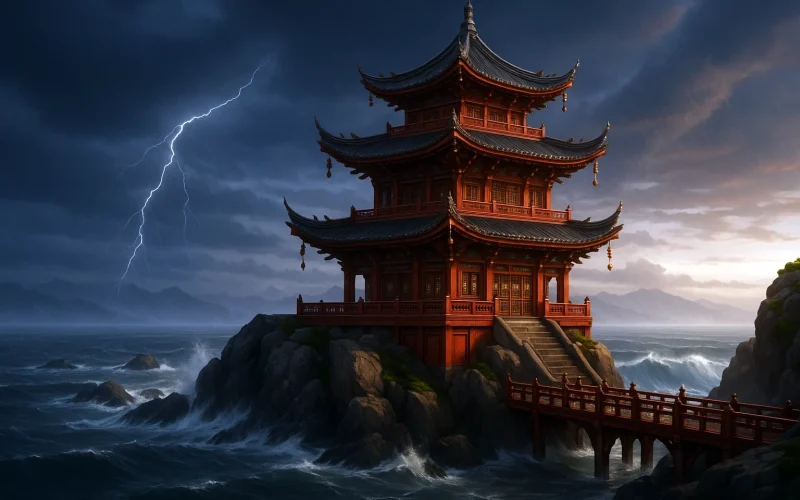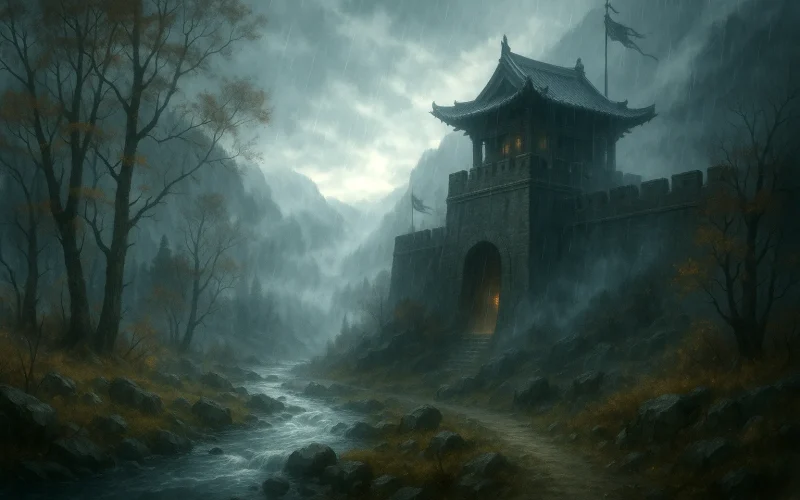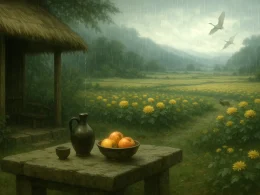Barbarous Chu—history's palimpsest scraped bare,
To whom beg answers of kingdoms that were?
Zheng Xiu's erotic glyphs now erased,
Qu Yuan's verses—world's performative waste.
Peaks gorge on dynasties' fossil bones,
Dawn clouds mate with dusk rain in one-night zones.
Leaning on this tower where suns decompose,
Only my spleen knows how ennui grows.
Original Poem
「晚望」
曾巩
蛮荆人事几推移,旧国兴亡欲问谁。
郑袖风流今已尽,屈原辞赋世空悲。
深山大泽成千古,暮雨朝云又一时。
落日西楼凭槛久,闲愁唯有此心知。
Interpretation
Composed during Zeng Gong's later years amidst the political and cultural shifts of mid-Northern Song, this poem reflects the scholar-official's meditation on historical cycles through the lens of Chu Kingdom's legacy. Drawing upon the contrasting figures of seductive Consort Zheng and exiled patriot Qu Yuan, Zeng examines the paradox of political transience versus cultural endurance. Written when his own career faced recurring uncertainties, the work transforms personal reflection into a philosophical inquiry about legacy and remembrance in governance.
First Couplet: "蛮荆人事几推移,旧国兴亡欲问谁。"
Mán jīng rénshì jǐ tuīyí, jiù guó xīngwáng yù wèn shuí.
How many shifts these southern lands have seen; / who now explains the fallen Chu's rise and wane?
The rhetorical question "who now explains" (欲问谁) underscores history's selective memory. "Southern lands" (蛮荆), once Chu's heartland, become a palimpsest of erased political narratives, mirroring Song anxieties about their own frontier stability.
Second Couplet: "郑袖风流今已尽,屈原辞赋世空悲。"
Zhèngxiù fēngliú jīn yǐ jìn, Qū Yuán cífù shì kōng bēi.
Zheng's allure lies entombed with ancient kings; / Qu's verses haunt us as hollow lamentings.
The juxtaposition of Consort Zheng's (郑袖) vanished sensuality and Qu Yuan's (屈原) enduring literary sorrow presents governance's dual legacy—political glamour fades while artistic protest persists. "Hollow lamentings" (空悲) questions whether cultural memory truly compensates for political failure.
Third Couplet: "深山大泽成千古,暮雨朝云又一时。"
Shēnshān dà zé chéng qiān gǔ, mù yǔ zhāo yún yòu yī shí.
Mountains and lakes outlast dynastic dust; / dawn clouds, dusk rains—mere moments of mistrust.
The geological "mountains and lakes" (深山大泽) symbolize natural law's constancy, contrasting with meteorological ephemera that mirror political instability. The temporal markers "dawn-dusk" (朝暮) compress cyclical change into a single day's metaphor.
Fourth Couplet: "落日西楼凭槛久,闲愁唯有此心知。"
Luòrì xī lóu píng kǎn jiǔ, xián chóu wéi yǒu cǐ xīn zhī.
At sunset on this tower, leaning long, / my idle grief—a solitary song.
The "idle grief" (闲愁) belies its depth—what appears as casual melancholy actually distills a lifetime's political wisdom. The final "solitary song" (此心知) echoes Qu Yuan's isolated integrity, suggesting some truths resist communal transmission.
Holistic Appreciation
This poem unfolds through the act of ascending a tower to survey distant views—progressing from "gazing" to "remembering", and ultimately to "enlightenment." The opening couplet looks out over the ancient lands of Chu, using historical vicissitudes to introduce the theme of "how human affairs shift and change." The second couplet alludes to Zheng Xiu (a seductive courtesan) and Qu Yuan (a loyal minister), contrasting beauty and loyalty to suggest how rise and fall are always tied to human passions. The third couplet shifts to scenery, where "deep mountains and vast marshes" juxtaposed with "dusk rain and dawn clouds" create a contrast between permanence and transience, deepening reflections on "flourishing and decline." The poem concludes with "sunset over the western tower," where quiet introspection captures the solitude left in the wake of worldly affairs.
Structurally, the poem moves from broad to intimate, blending historical depth with personal reflection. It carries both concern for the nation and lament for life's impermanence. Tight in form yet fluid in meaning, it balances the abstract and concrete, scene and emotion, showcasing Zeng Gong's late style—melancholic yet open-hearted, timely yet self-possessed.
Artistic Merits
- Scene and Emotion Intertwined, History as Meditation
The poet skillfully uses immediate scenery to evoke inner feeling, layering past figures and natural landscapes to create temporal and spatial contrasts. - Allusions Natural, Meaning Beyond Words
Zheng Xiu and Qu Yuan, both historical figures of Chu, are cited not to show erudition but to serve the poem’s emotional depth, enriching its historical resonance. - Balanced Parallelism, Concise Diction
The couplets are rigorously parallel, with lines like "deep mountains and vast marshes" paired against "dusk rain and dawn clouds"—juxtaposing ancient and modern, eternal and fleeting, embedding philosophy within imagery.
Insights
This poem reminds us: human life is fleeting, beauty fades, yet nature endures. The poet’s lament for Zheng Xiu’s vanished allure and Qu Yuan’s futile loyalty mourns not just history but mirrors our present. We ought to cherish the moment, acknowledge emotions and duties in our brief lives, and maintain a calm, clear mind—so even in solitude, we may find peace and awakening amid the world’s ceaseless changes.
About the Poet
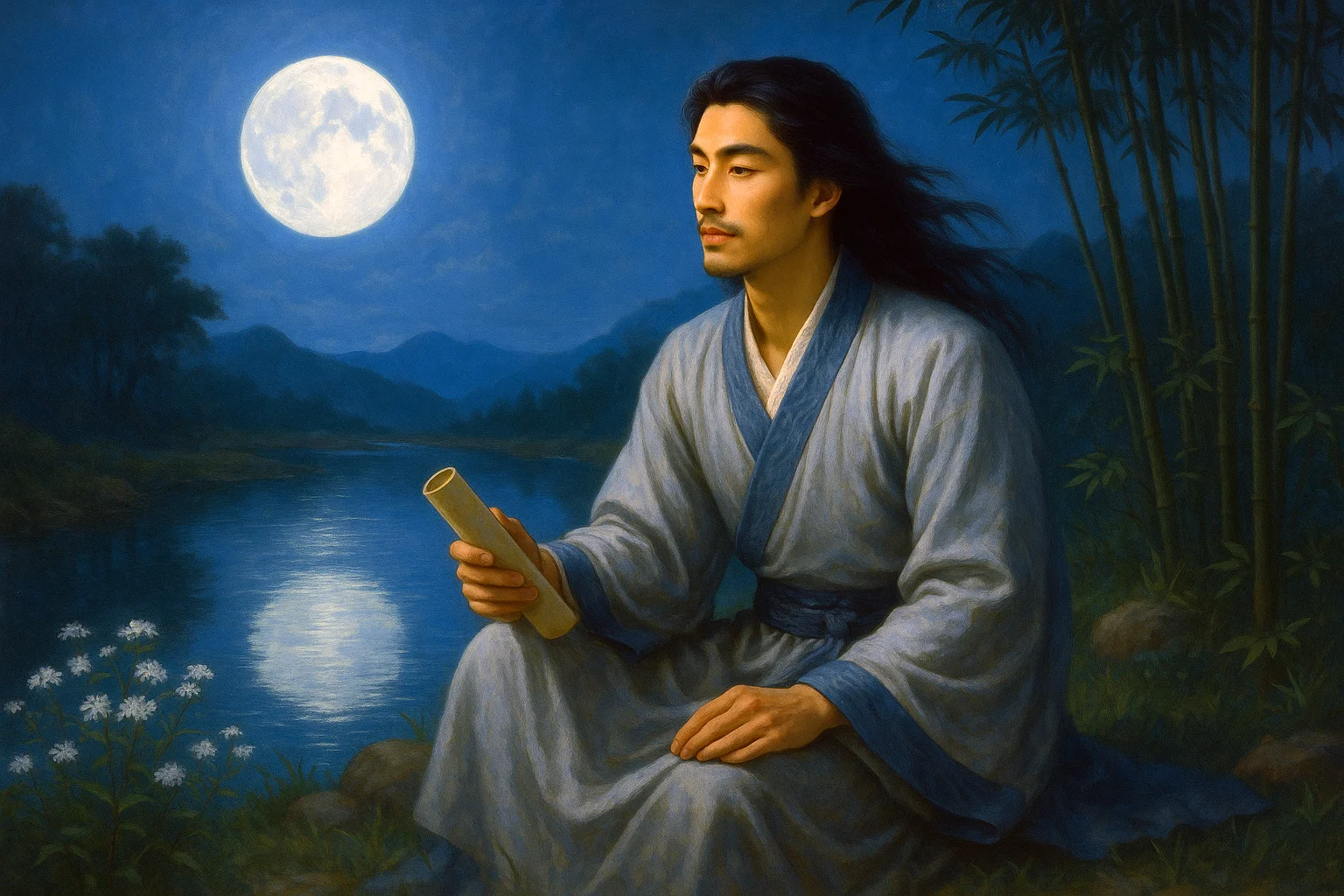
Zeng Gong (曾巩, 1019 - 1083), a native of Nanfeng in Jiangxi province, stands among the illustrious "Eight Great Masters of Tang-Song Prose." His writings distinguished themselves through an elegant classical balance, celebrated for their rigorous argumentation and refined literary craftsmanship. While his poetry embraced an artless subtlety, his prose achieved what critics hailed as "the very essence of purity" - an achievement that, though perhaps less dazzling than his contemporaries like Su Shi or Wang Anshi, earned him posthumous reverence as the founding master of the "Nanfeng Literary School."






